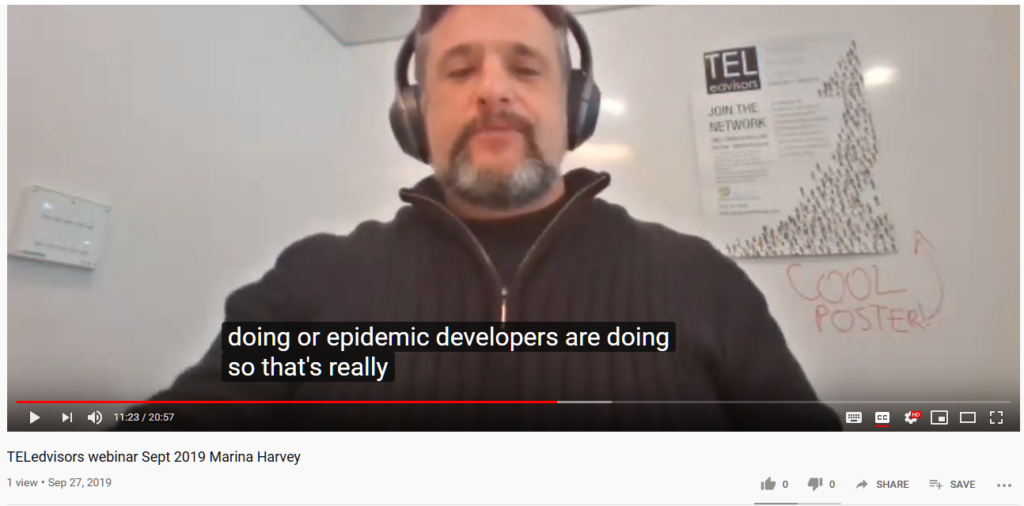I carried on a bit about how great Uibelhoer’s thesis was recently in covering some much neglected ground and offering some new ways to think about the research I’m doing in my own one. This thesis is one that I’ve had on the pile for a while but I did note that it was also well referenced in Uibelhoer’s. I’ve just finished pulling together some 7000+ words of notes and quotes and ideas from it, so this will not be a post at the same scale but I’ll mention some key reasons why this one is also great.
I’m not sure why I avoided the American literature for so long – I guess because my focus was on the work of edvisors in the Australian HE context. But really, there are so many common issues between the two sectors and I’ve found so much stuff (some written well after I started looking, to be fair) that speaks to things that I had thought to be major gaps in the literature that I am lightly kicking myself.
In a nutshell, Drysdale explores the question of what kind of organisational structures in HE institutions enable edvisors to have the most impact in the work they do supporting (in this case) online learning. I think that it is because many of the researchers that I’ve been reading lately are also Instructional Designer/Edvisor practitioners (rather than interested academics) that I’ve been finding a deeper understanding of some of the nuance in these situations. In particular, ask any edvisor and they will tell you that there are centralised teams and there are faculty based (using the Australian meaning relating to colleges/discipline areas, not faculty=teachers) teams and frequently never the twain shall meet. On top of this, some edvisors as classed as academics and report to academics and others are professional staff with other reporting lines. (To my knowledge, for the most part in Australia, few edvisor units report to IT or other administrative units but this is something that I do need to pursue)
Drysdale does three case studies of ID/edvisor teams supporting and/or leading online learning initiatives in 3 different unis with different structures:
“a centralized dedicated instructional design team with academic reporting lines and distributed curricular authority,
a centralized dedicated instructional design team with administrative reporting lines and distributed curricular authority,
a decentralized or blended-structure instructional design team,
with either academic or administrative reporting lines, and distributed curricular authority.”
Drysdale, 2020 P.54
Spoiler alert, he found that overall, IDs/edvisors working in a centralised structure, with academic reporting lines (I assume they also held academic roles) were the most effective and encountered the fewest barriers in leading online learning initiatives.
Obviously this is a relatively small study, interviewing an ID, an academic and a leader in each of the institutions and there could well be more at play (institutional culture for instance) but Drysdale does a decent job in allowing for this as much as possible in the work.
For now, I might just highlight some of the most valuable ideas that I found in the thesis. Lots of great new literature resources for one – again, I don’t know why I didn’t look beyond Australia for the most part in my earlier scans. That said, it’s interesting that in all the US theses that I’ve read recently, nobody seems to be aware of Whitchurch’s work on Third Space workers in Higher Ed. So maybe we can all be a little insular at times.
I have a few new theoretical frameworks to explore – Systems theory (Patton, 2015) which explores how organisational systems work. There are also a few takes on leadership – Transformational Leadership, Authentic Leadership and Shared Leadership. The idea that leadership practices are influenced by organisational structures makes a lot of sense but is something I haven’t considered in depth until now. (Sometimes I do really wonder how much my thesis is actually about education at all compared to sociology and organisations and power)
There’s a lot to think about as well in terms of where control of curriculum and course content sits and what impact this has on institution level learning and teaching initiatives. Building on that, something that I don’t think anyone has really explored but which I do hear regularly as an argument for faculty/decentralised edvisor units is how disciplinary needs and focuses do necessitate discipline specific learning designer (etc) approaches. I can appreciate that there are truths to this but unpacking that from the need to feel special is a job of work. (One that absolutely needs to be done though)
Role clarity – more accurately the lack of it – absolutely came up. Holding academic positions with parity to “standard” academics in these cases did certainly seem to minimise that though. I have many conflicting positions about academic vs professional roles. I’ve always held a professional role and believe that the skills and knowledge of the edvisor should be recognised regardless, but at the same time, I understand that people in organisations can live in any number of tribes that are important to them.
A few other things came to mind that I haven’t yet seen covered but which are absolutely emerging in the sector – where do edvisors/IDs from external (often corporate) providers sit in this picture?
Questions about what it actually is that IDs do are perennial and there is some nice work in here exploring what the literature has to say and some of the practitioners. This is absolutely something that I am also focussing on. An interesting stat to emerge was that most IDs spend <50% of their time actually doing instructional design. Much of the rest of administration, training and tech support. (I’ll leave the bigger question of whether those things are also design in essence to another time). The kinds of training that IDs/edvisors provide is touched on, referring to work by Meyer and Murrell (2014) showing that it is a mix of tech and pedagogy training, with the tech side valued less but perhaps done more.
It’s been fantastic looking at the recent work being done in this space – I can still see that mine is adjacent but aligned, so I’m not concerned about not bringing something new to the party. Many of the issues that we as edvisors face do appear to be fairly global and it’s great to be a part of the conversation surrounding it.



